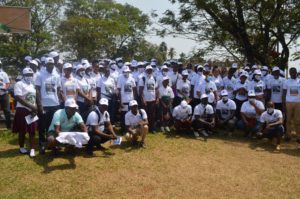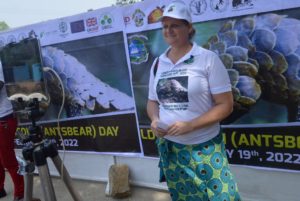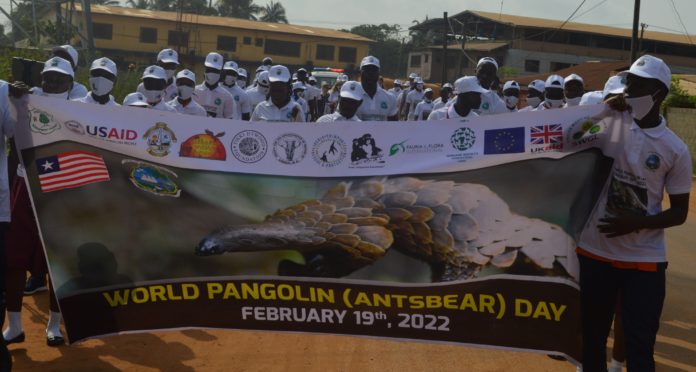The government of Liberia and partners working in the forest sector of the country on Saturday February 19, 2022 held an elaborate program marking World Pangolin Day.
The Day is consistent with the global protocol that calls for all nations to protect and raise maximum awareness on the environmental importance of Pangolins and their role in protecting the forest and biodiversity.
Labeled as colorful and yet another successful occasion, the third celebration of Pangolin Day held at the Paynesville Town Hall outside Monrovia was graced by a number of key government officials, representatives of foreign missions, civil society groupings, students, cultural groups, market women group, among many others.
As prelude, the groups began parading from the Joebar, ELWA to the Paynesville City Park where the indoor event took place. .
Representing FDA Managing Director, C. Mike Doryen, as keynote speaker, the Wildlife Consultant to FDA, Edward Gbeintor acknowledged the sustained collaboration that exists between FDA and its national and international partners and called for further increased collaborative efforts at a time when illegal activities against the health of the forest and protected animals were on the increase.

Mr. Gbeintor use the occasion to reiterate FDA’s unrelenting collaboration with its partners at all times, if and when, our forest and wildlife treasures are to remain environmentally safe or preserved to benefit present and succeeding generations.
He raised alarm against the possible danger to the survival of the forest when Pangolins and other wildlife are left unprotected only to get extinct through unwarranted means including trading, killing, hunting and trafficking, something he said obviously undermines the existence of mankind.
The keynote speaker then urged all partners to join the government through the Forestry Development Authority in remaining combative against those illegal activities that tend to undermine efforts being exerted to preserve the forest and biodiversity. He continued, “ the day is an opportunity for pangolins and the communities to join hands in raising awareness about these unique mammals,” adding, “ pangolins are a highly prized commodity often illegally trafficked and killed for its scale by organized crime network, he noted based on prevailing research.
The Executive Director of the Environmental Protection Agency, Wilson Tarpeh said admit the growing challenges in protecting the Country’s wildlife and ecosystem, the Government of Liberia being aware about these challenges remain committed to the process of wildlife and ecosystem protection.
Mr. Tarpeh noted that some of the challenges borders on the provision of alternative livelihood to affected forest communities to enable them transition from commercial hunting and random farming in the Forest without any further precondition.
He said consistent with International best practices, the Liberian Government through the Environmental Protection Agency concluded its Nationally Determining Contribution(NDC), a roadmap intended to enhance sustainable environmental manage including forestry.
Mr. Tarpeh, however, called on economically powerful nations to see reason to support the rollout of the NDC in order to increase efforts in tackling wildlife trafficking, deforestation and climate change.
The EPA Executive Director furthered that Liberia is in a better position to reduce globe emission owing to its vast forest resources and only collective National and International support and effort will enable the forest remains in tight.
Also speaking, a Representative of the EU, Stephen Cocco said the EU has resolved to invest EUROS 50,000,000 in the forestry.
Mr. Cocco said most of the money will go towards the fight against wildlife trafficking and sustainable forest management.
He said the essence is for people to transition from commercial wildlife hunting and go into other livestock farming.
Mr. Cocco noted that pangolin is very much crucial to the ecosystem.
Meanwhile in separate remarks, the partners including USAID, UK, EU, FFI, HSI, LCRP, WCF, SCNL, WABiLED, EPA, LiWiSa among others have promised to invest in the forest sector but called for robust actions against wanton violators who are bent on illegally destroying the forest and biodiversity. They called for an uncompromising law enforcement regime that will deter the ugly habits of poaching, hunting, trafficking and killing of pangolins and other wildlife.

Earlier, the Executive Director of Libassa Wildlife Sanctuary, Susan Wiper provided the overview of the program and appreciated the FDA and all partners for honoring the invitation to attend the occasion she said is very critical in the protection of wildlife consistent with the law that prohibits their illegal killing, hunting and trading.
More on Pangolin
Current research indicates that there are 8 species of pangolins in the world (4 in Asia, 4 in Africa) including White-bellied pangolin (Phataginus tricuspis), the Black-bellied pangolin (Phataginus tetradactyla) and the Giant Pangolin (Smutsia gigantea).
Liberia is home to 3 of them. Because the Asian species are already close to extinction, many pangolins are being poached all over Africa to be shipped to Asia (mostly China and Vietnam), where they unrightfully believe the scales of the pangolin serve medical purposes and where the meat is considered a delicacy. This makes pangolins the most illegally trafficked mammal in the world. Their scales are wanted more than rhino horn, elephant tusks or tiger parts combined!
According to researchers’ estimate 1 million pangolins have been illegally traded in the last 16 years and given the current increased scarcity, it has been difficult to estimate current populations of the 8 pangolin species. However, international pressure has mounted to prevent the pangolin’s extinction.
A few years ago, at CITES’ Conference of the Parties, where the world’s conservation agencies meet, pangolins received appendix I protection. Appendix I means the highest level of protection offered by the organization and urges the 183 affiliated nations to enforce the strictest possible conservation measures. In Liberia, all pangolins are protected by law: it is a federal crime to hunt, kill, eat and keep them.
All confiscated pangolins are brought to the Libassa Wildlife Sanctuary which happens to be the first Wildlife Sanctuary established in collaboration with the Forestry Development Authority (FDA). It’s the first and only wildlife rescue center for different animal species in Liberia and was founded in 2017.
Their main mission is rescue, rehabilitation and release of confiscated protected animals. So far, 57 pangolins have entered the sanctuary with help from FDA and the Confiscation Unit (funded by EU) and 38 have been released back into the wild! Rehabilitating pangolins is not an easy job to do: many die due to dehydration and stress, and keeping them alive until release requires many hours of walking in the forest for them to forage on ants and termites.
Pangolins play an important role in keeping the forest healthy: they are the only mammal in West-Africa to control ants and termite populations. Without pangolins, the forest we rely on for oxygen and timber will be destroyed. That is why it is of great importance to preserve pangolins in Liberia.






















